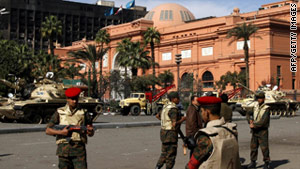The fiery, bloody clashes between demonstrators in Cairo -- with soldiers watching with seeming indifference -- is an apparent maneuver by the Egyptian military to raise popular support for their intervention and the old guard police state, analysts say.
Egyptian state television on Wednesday went so far as to portray the protesters as members of a radical fringe and bluntly stated: "Let the military take over and protect you and Egypt."
"We have confirmed reports that there are radical elements heading to cause internal strife. They have balls of fire and they want to start fire in the Tahrir (Liberation) Square," Egyptian television said.
Much international media coverage has focused on the violence in Cairo's Liberation Square between antagonists and protagonists for embattled President Hosni Mubarak. It remained unclear whether such confrontations were being repeated elsewhere. Contesting rallies in Egypt's second-largest city, Alexandria, were largely peaceful. Other Cairo neighborhoods also remained calm.
But Wednesday's events in Liberation Square highlighted pro-Mubarak demonstrators charging -- dramatically on horseback and camels -- anti-Mubarak protesters, the first sign of a counter-demonstration after days of mass anti-government protests.
In stark juxtaposition, as the violence unfolded, the army did nothing.
"The military's refusal to act is a highly political act which shows that it is allowing the Egyptian regime to reconstitute itself at the top and is highly, utterly against the protesters," said Joshua Stacher, assistant professor of political science at Kent State University and an expert on Egypt. He was among more than a dozen Middle East experts who met Monday with three White House National Security Council officials to talk about the Egyptian crisis.
The absence of military action serves two purposes, Stacher said.
"(One,) make the protesters go home, and two, scare the population that isn't protesting," Stacher said. "They want the Egyptian people to submit to the police state, and they want the people to pine for their police state so that they have stability back."
"It's getting really ruthless," Stacher added.
In Egypt, Vice President Omar Suleiman issued a statement saying that dialogue with opposition forces, as ordered by Mubarak, won't begin until the demonstrations stop. Mubarak had incited another round of protests Tuesday when he said he would wait until the September elections to step down. Demonstrators said they wanted an immediate exit by Mubarak.
Meanwhile, Secretary of State Hillary Clinton has begun a round of discussions with Suleiman as the Egyptian government has begun defending the pace of change and pushing back against American criticism, according to a senior U.S. official.
Egypt's president is going to move at his own pace and not be pressured by Obama and other world leaders, an Egyptian government official told CNN.
At the same time, a senior U.S. official is expressing concern about Mubarak's ties to the violence in Cairo.
U.S. officials are suspicious that Mubarak loyalists unleashed pro-Mubarak forces to intimidate protesters, the U.S. official said. "Perhaps" Mubarak is making a mess that only he can "solve," the source added.
In a public statement, the spokesman for the State Department called for restraint.
"The use of violence to intimidate the Egyptian people must stop. We strongly call for restraint," P.J. Crowley said in a statement Wednesday.
However, an Egyptian government official said the government has a "serious problem" in how the Obama administration has been "spinning" the events yesterday to give the impression that Mubarak's statement was given under pressure or a "nudge" from Obama.
Robert Kagan of the Brookings Institute said the military appears to be facilitating the pro-government demonstrators in Cairo.
"It tells me that the military doesn't appear to be playing the neutral, benevolent role that we hoped it would," Kagan told CNN. "It does appear to be not only allowing these brutal pro-government thugs to come in and attack the protesters but maybe even facilitating it, which raises very serious questions about what role the military intends to play in this whole period of transition.
"It's a very cynical move which I hope the rest of the world, and particularly the United States, don't fall for," Kagan said.
Michele Dunne, a senior associate at the Carnegie Endowment for International Peace, said it was unclear what the military's agenda is.
"Does this mean they're committed to Mubarak, or does it mean that perhaps they're giving him one last chance, one last try to see if he can get control of the streets and get the demonstrators out?" Dunne told CNN.
"I think today we saw a very ugly face of this regime. These are tactics that are well-known in Egypt and have been used many times before -- to send regime thugs to break up peaceful demonstrations," she said.


No comments:
Post a Comment